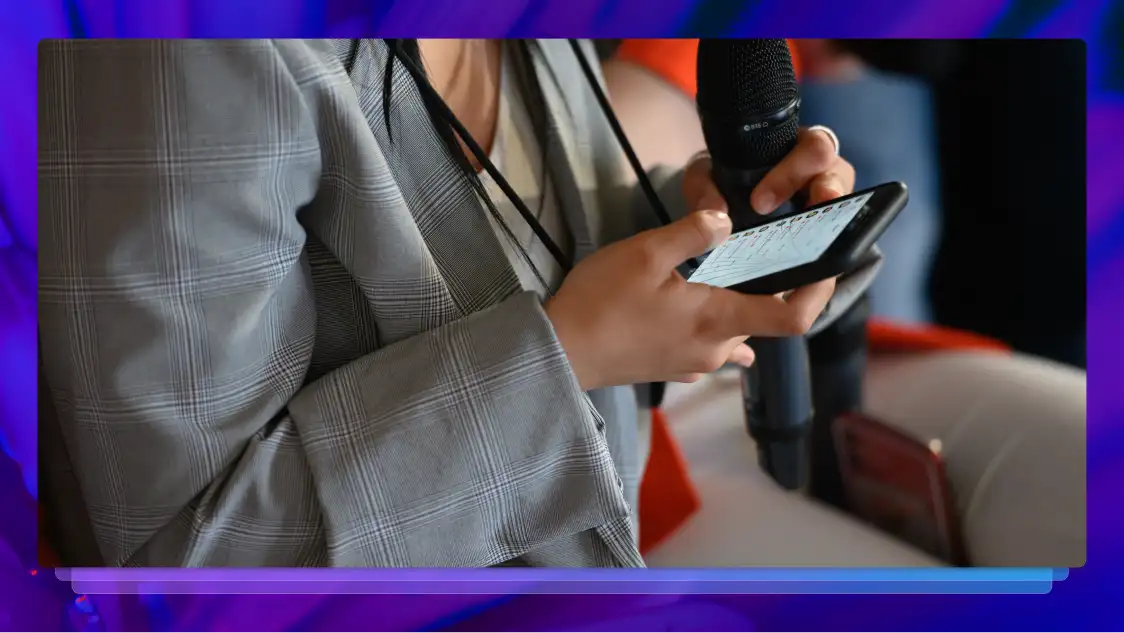15 Phone Interview Tips For Journalists, Job Seekers, and Researchers
There’s a lot to nailing an interview, whether you’re a journalist, researcher, or job hunter. Here are some tips to help you succeed.

Successful interviewing is an acquired skill — blending the ability to read another person and communicate effectively. Whether you’re the interviewer or the interviewee, a job-seeker or a journalist, it takes equal parts finesse and preparation to pull it off.
This is especially true today, when many interviews take place not in person but over the phone. Without the benefit of body language and face-to-face communication, interviews require even more attention and adeptness.
In this article, we’ll explore some of the most important phone interview tips for job seekers, hiring managers, journalists, and researchers. Whatever your position, these tips will help you effectively guide an interview or get your message across.
Interview Tips For Job Hunters and Hiring Managers
Job interviews are a rite of passage, and nearly all of us have been (or will be) on one side of the table at some time or another. Whether you’re a recruiter wondering how to conduct an interview over the phone or a job applicant trying to make an impression, the following phone interview techniques will help you succeed.
1. Be Professional
In some ways, a phone interview may feel less formal, but you shouldn’t treat it that way. As an interviewer or interviewee, you still want to make a strong impression, and that starts with being professional.
Here are a few ways to bring a sense of professionalism to the moment, even if you’re interviewing from your kitchen table:
- Prepare: Review your résumé (or the candidate’s résumé, if you’re conducting the interview) and prepare questions, answers, and examples in advance.
- Remove distractions: Don’t have your latest Netflix episode queued up in the background or your family coming and going through your room. Get in a quiet place where you can focus — with noise-canceling headphones, if possible.
- Charge your phone: Dropping a call due to a dead battery is not the impression you want to leave.
- Consider dressing up: Even though the recruiter or candidate can’t see you, it may help you feel more confident and take the interview seriously.
2. Project Enthusiasm
Just as it’s harder for you to read the other person on the phone without body language, it’s more difficult for them to read you. They can’t see whether you’re engaged when they speak — all they have is what they hear. Project extra enthusiasm in your voice to make up for the lack of visual communication and connection.
You don’t have to go over the top to make an impression. Think of the interviewer like you’re talking to a good friend, and talk in the same relaxed, friendly manner. Use more expressive phrases like “Absolutely,” rather than “Okay.” And smile — even though they can’t see you, they’ll hear it in your tone.
3. Make Sure Your Voicemail Is Professional
Whether you’re the job seeker or hiring manager, your goal should be to answer the call when it comes through. But if you do miss the call, you certainly don’t want the other person to encounter an unprofessional or silly voicemail on the other end. One lesser-known way to prepare for a phone interview is to record a warm, professional voicemail in advance.
4. Don’t Conduct the Interview Differently From an In-Person Interview
Whether you’re a hiring manager or job seeker, you may be tempted to radically change your approach when conducting an interview over the phone vs. in person. However, while there may be subtle differences, your overarching approach should be the same.
Take time to engage the interviewer or candidate on a personal level. Listen carefully and let their responses guide your responses rather than rotely following your list of questions or answers. Allow space (and even some pauses) for them to consider their responses, remembering to treat it like a real conversation with another person. The phone may be inherently more awkward than a face-to-face interview, but try to make it feel as similar as possible.
5. Take Notes
On the phone, it may be a little easier to get lost in thought or distracted by something at home. Taking notes can help you stay focused and remember something you want to say about your work history or a question you want to ask the candidate next. Have your pen and notepad ready right from the start.
If you’re going through a multi-interview process, you can even use Rev to record and transcribe the interviews so you don’t have to keep up with all your notes by hand. That way, you can review the transcription to jot down important points and follow-up questions for the next round.
Journalist Interview Tips
Perhaps no profession requires mastery of the art of interviewing more than journalism. Reporters must be especially attentive to their subjects and the needs of the story, as finding the right question or timing it correctly can be the difference between a bland answer and a quote-worthy quip. Here are a few reporter interview tips to help you get more of the latter.
1. Be Prepared
Preparation is essential for reporters. It’s in doing your research and digging up background information that you come up with the best journalistic questions to craft a plan for your conversation.
Preparing ahead can also help you avoid wasting your subject’s time, as you’ll find basic info such as their name spelling, job title, and relevant expertise for your story. Plus, getting acquainted with the subject can help you craft a narrative that will help you shape your interview.
2. Inform the Source Before Recording
Recording may not be required for job interviews, but it’s par for the course for reporters. Nonetheless, you should still give your source a heads-up before you roll the tape — especially when they can’t see you over the phone. In some states, the subject’s consent is legally required before you start recording.
3. Listen Actively
Careful listening is always integral to journalistic interviews, where an off-handed response may clue you into an entirely different line of questioning. And again, without the benefit of face-to-face communication, it’s all the more important to listen closely and actively. Pay attention to their tone, note hesitant answers, and listen for little details that may shed new light on the story.
4. Use Rev to Record and Transcribe the Call
It’s difficult to listen actively if you’re focused on furiously typing or scribbling notes to capture every quote. Using a call recorder for your phone interview (like Rev) can make you a better interviewer by freeing you to devote your attention entirely to the interview itself.
When you use Rev’s free call recorder app, you not only get a clear recording to review but you also receive an automated transcript to use for quotes and important interview highlights. All you have to do is review for accuracy rather than trying to recapture each quote word for word, saving you loads of time on the back end.
5. Know When a Phone Call Isn’t Sufficient
Want to learn one of the most important phone interview tips for journalists? Know when it shouldn’t be a phone interview at all. Some sources and topics just demand a more engaging interview or require the sensitivity of an in-person conversation. As a reporter, it’s your job to know the difference.
If you’re in the middle of a phone interview and find that the subject isn’t offering much detail or seems distant, those may be signs that an in-person follow-up is necessary. At that point, you could say something like, “This has been a great start. I’d like to review my notes and schedule a follow-up interview to go over more in person or over Zoom.”
How to Run a Productive Research Interview
Market research and qualitative research are other common scenarios for phone interviews, and these require special attention. Unlike quantitative interviews, which focus on data, qualitative research requires uncovering deeper insights into subjects’ emotions, motives, and perceptions. Here are a few tips for conducting research interviews over the phone.
1. Consider Sending Questions in Advance
In qualitative or market research, the goal is to uncover as many insights as possible. If you want thoughtful responses, it may help to send your research interview questions ahead of time. This gives the subject time to prepare and consider more detailed answers.
However, some research may be better off with more spontaneous, off-the-cuff answers. In that case, you might consider sending a general overview of topics and questions without offering extensive details.
2. Make the Subject Comfortable
Studies have shown that the most effective qualitative research occurs when subjects feel at ease and respected during the interview. When researching highly sensitive topics, telephone interviews give you a good start because they enhance the subject’s sense of anonymity.
Don’t rely solely on that sense of anonymity, though. Making extra effort to convey understanding and build rapport over the phone can help open up the subject and unearth deeper insights. Listen attentively, avoid communicating any judgment, and don’t rush the subject through their responses.
3. Push Past Canned Responses
Again, this isn’t quantitative research, and you’re looking for more than simple data or “yes or no” answers. Craft qualitative interview questions that probe deeper and invite more thoughtful, reflective answers.
That means you should aim for open-ended, non-leading questions that invite subjects to share their experiences, motives, and opinions about your product or particular interview topic. If an answer lacks substance, don’t be afraid to follow up for more. Some examples of follow-up questions include:
- Can you tell me more about that?
- How did that experience alter your next decisions?
- Can you explain what you mean by that statement?
- Why do you think that is?
- Could you say that another way?
- How did you come to that conclusion?
- How did you feel about that experience?
4. Summarize for Accuracy
For research, it’s critical that your findings accurately represent the views of your subjects. At the end of a round of questions or the interview as a whole, take some time to summarize your notes back to them. This gives them a chance to correct any inaccuracies or clarify any misunderstandings — which is especially important when they’re one step removed over the phone rather than in person.
5. Enhance Your Research With Rev
Like journalists, researchers also benefit from any tools that can remove distractions during an interview or save them time during the review process. Rev’s voice recording and transcription app allows you to focus your attention where it belongs — on the interview subject and your conversation.
After the interview is over, you’ll have a full recording of your research interview, along with a transcription you can use to review and summarize key points. This record can prove invaluable for ongoing analysis as you continue your research.
What Are the Five Cs of Interviewing?
In the world of job interviews, experts often refer to the “five Cs” of interviewing: competency, character, communication skills, culture fit, and career direction:
- Competency: Does the candidate have the relevant skills and knowledge to do the job effectively?
- Character: How does the candidate handle differences or adversity in the workplace? How do they approach new challenges?
- Communication skills: Does the candidate demonstrate an ability to empathize with others and convey their viewpoints respectfully? How well do they articulate their thoughts?
- Culture fit: Does the candidate seem like a personality fit for the company?
- Career direction: Does the position align with the candidate’s career goals and seem like it will motivate them at this stage?
It’s the role of the interviewer to ask questions and conduct the interview in a way that they can evaluate each of these qualities. As an interviewee, it’s your job to showcase each of these features in your answers and in how you carry yourself during the process.
These attributes can also apply to other types of interviews. For instance, researchers might look for the “culture fit” of potential subjects to ensure they fit the profile of their ideal customer, or journalists might look for “character” attributes of a subject to add color and detail to a story.
What Is the Number One Question Asked on a Phone Interview?
If you’re still wondering how to prepare for a phone interview, it helps to consider the questions you’ll be asked. And tops on this list for most job interviews is, “Tell me about yourself.”
Of course, they want to know specifics about your work history and experience, but this broad, open-ended question is really meant to break the ice and get you talking about whatever is top of mind. Instead of shooting from the hip, prepare a thoughtful answer in advance, highlighting aspects of your work history or personality that would stand out in connection with the job you’re seeking or the topic of the interview in general.
Master Phone Interviews With Rev
Phone interviews may be a little awkward, but they’re increasingly common. Whether you’re interviewing for a job, assessing a candidate, or conducting journalistic or research interviews, it helps to know your way around all the best phone interview tips so you can handle the process confidently. These will help you prepare and set you up for success.
With Rev’s AI-powered recording and transcription services, you can remove one major distraction from many phone interviews. Focus on the conversation, not the recording or note-taking process.















